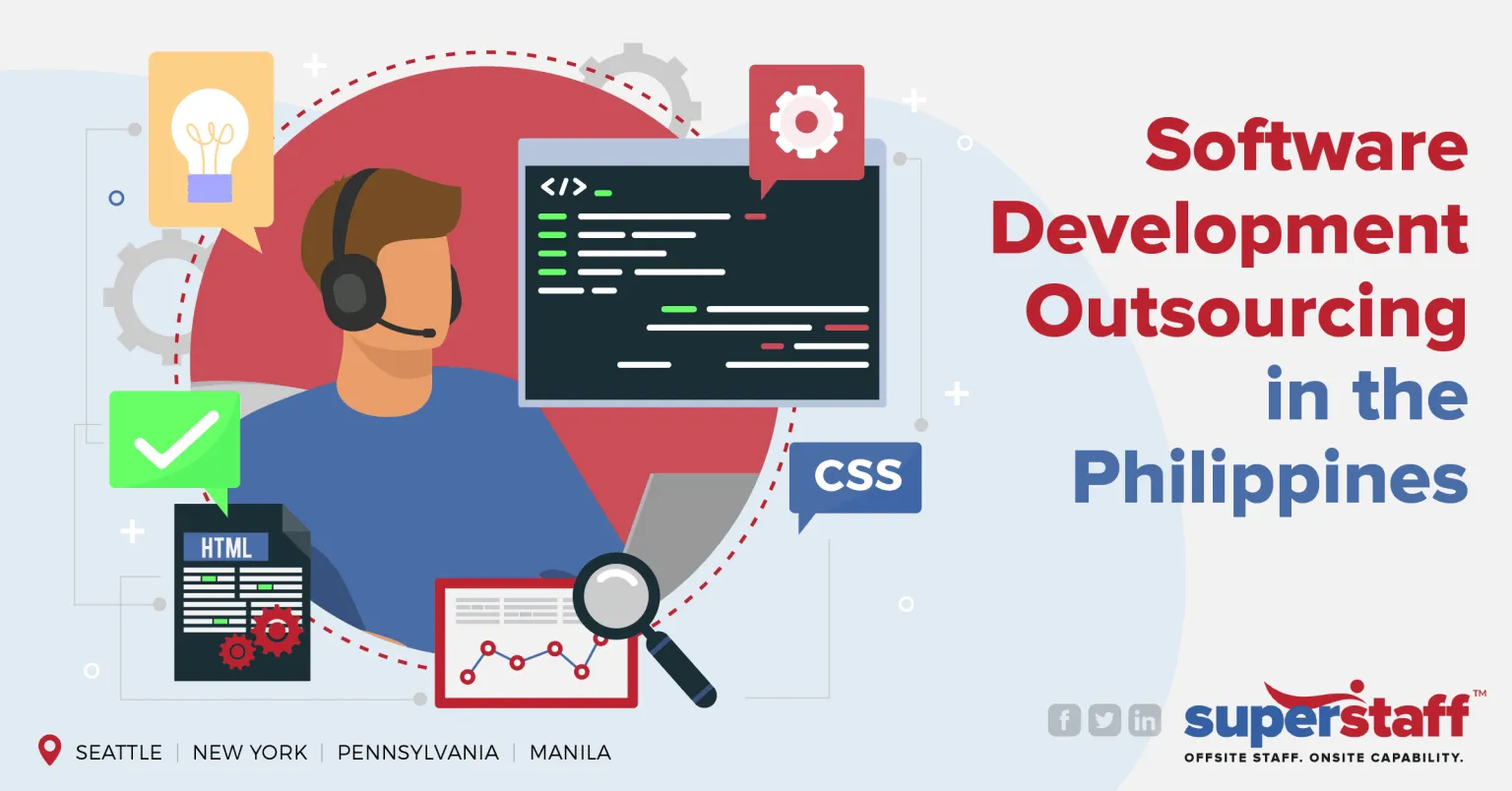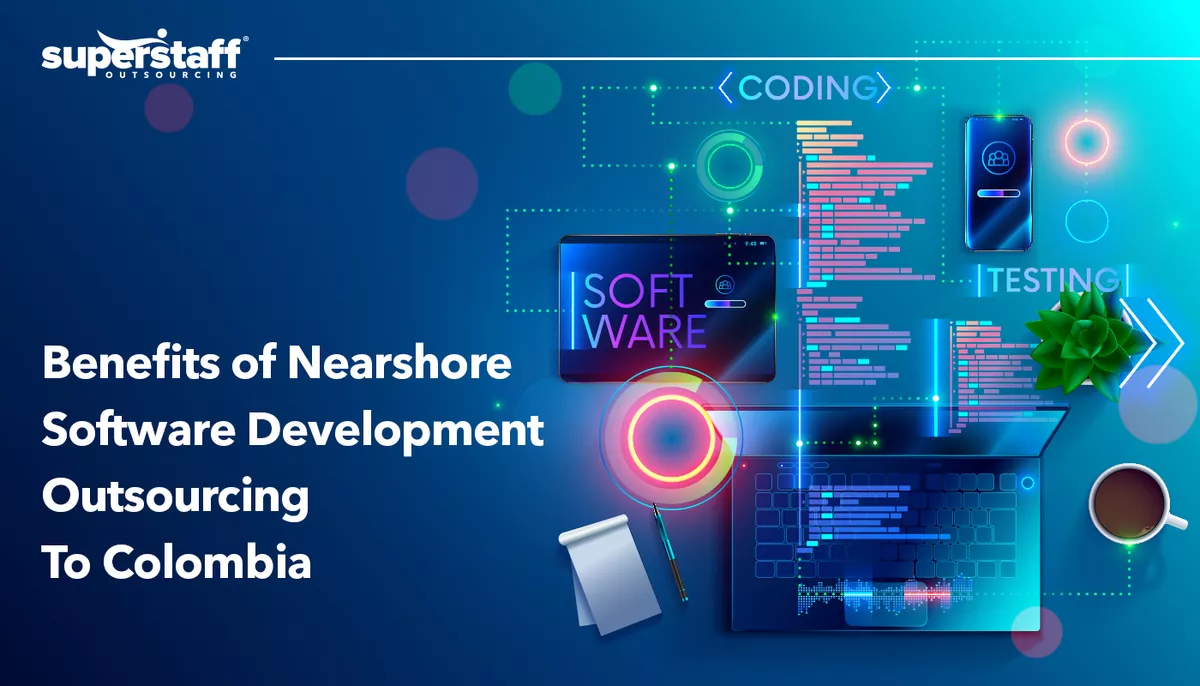
Outsourcing Software Development: What’s Hot
Software outsourcing is a form of IT outsourcing focused on rendering full development and maintenance of custom software. Third-party vendors offer services to streamline systems, and develop software such as e-commerce platforms, customer relationship management applications, and internet and intranet solutions in a company.
IT jobs represent more than 60 percent of the overall outsourcing industry across the world. In a 2017 report, Statista Outsourced Statistics confirms the following data about outsourcing software development:
- 64 percent of the companies outsource the software application development
- 51 percent outsource software application maintenance
The Philippines has established its leadership position in the IT-BPM sector due to the strengths of its IT workforce. In the early years of the market, nearly all investments were directed to the National Capital Region (NCR). However, IT-BPM businesses are expanding the number of their employees across the country. In 2019, the industry has over 1.3 million professionals—a 5.8 percent growth from 2018. By 2022, the number is projected to rise to 1.42 to 1.57 million workers within and outside Metro Manila.
The Philippines as the Innovation Hub of Asia
The IT workforce in the country moves up the value chain and continuously competes with global talents as the demand for software outsourcing increases. Different providers in the country can now offer more complex services such as software development.
The Philippines currently has a globally competitive IT workforce generating high revenue and an increased number of start-up companies, incubators, and innovators. This is proof that IT is the most dynamic and fastest-growing industry in the country—making the Philippines having huge potential in becoming the Innovation Hub of Asia.
No Longer Just About the Costs
The corporate world faced a new, fast-growing development in the late 1990s: outsourcing. With the support of third-party vendors, the American tech industry was a pioneer in evaluating the latest business approach. Since then, for both large companies and small start-ups, nearshore and offshore collaborations have become prevalent.
In the new era of digitization, software is transforming the world. No business goes without getting a software app. From the automation of internal operations to enhancing consumer experiences, software is a big necessity, regardless of the industry.
Cost-effectiveness has always been the key justification for outsourcing. However, outsourcing offers much more than cost savings. Here are the reasons why businesses all over the world are hiring third-party vendors where they can offshore their software development needs:
-
High demand and low supply of software developers globally
The world is constantly shifting to digitalization by using AI and Learning Machines. Therefore, businesses need to future-proof their businesses by going digital and ensuring their online presence with websites and web and mobile apps. There is no sign of stopping the rise of demand for software developers and engineers.
However, the continuous requirement for software developers around the world is higher than the number of the force itself. With the fast-paced changes in IT development tools, languages, and equipment, even the most modern educational systems can’t keep up to produce enough software developers.
-
Company culture is not suited to produce innovative software
Efficiency and the ability to innovate are two of the most critical factors behind long-term success. Large-scale companies focus more on efficiency achieved by hiring good managers, while other companies focus on innovating to achieve short-term efficiency to succeed.
Innovative companies may beat competitors that focus on operational efficiency from a long-term perspective. It is challenging for an established large enterprise to grow innovative culture from within, due to its scale.
-
Access to knowledge and expertise
Hiring a good Chief Technology Officer (CTO) is a great move for organizations building an in-house IT department. A good CTO must have extensive experience in the tech industry, preferably someone who has worked with different companies over the years.
However, working with a software outsourcing company is a better option. These companies have an established culture of innovation. They can share their best practices, talents, and top-of-the-line infrastructure gained through years of being in the field.
-
Reinforced Compliance
A non-IT-based organization—if they plan to hire IT professionals—has to go over through a series of compliance regulations like data privacy and cybersecurity. By hiring third-party software developer companies, businesses can focus more on their core operations and let the vendor take care of all legal paperwork in hiring and managing talents.
Types of Software Outsourcing Providers
For some businesses, building an in-house IT team is not an option since there are different types of software outsourcing firms to partner with. Choosing the right type of software house is beneficial from a financial perspective. It is also vital in ensuring the success of the IT venture of your business.
-
Enterprise-grade outsourcing companies
This type of vendor employs thousands of developers, project managers, and quality assurance engineers. Larger offshore development companies mostly work with enterprise-level projects owned by well-established institutions. Understandably, these firms work with clients with budgets starting at $300 thousand.
-
Mid-level houses
The mid-level houses employ 50 to 500 developers specializing in a large variety of products and services. Thus, this segment is the most saturated one. Some of the companies that fall into this category have a proven track record of producing quality products and services. However, some are still at their growth stage. This type of vendor often offers lower rates since they hire inexperienced junior developers. Mid-level outsourcing firms are frequently seen in India and China.
-
Premium-grade small software firms
Some of the most trusted offshore software organizations can be found in this segment. Companies under this category manage 5 to 50 developers and charge a higher rate scale compared to mid-level houses. These companies can deliver top-notch quality output within the agreed project timeline. Some of these third-party vendors have been in the offshoring industry for at least two to three years. They are relatively new, usually managed by foreigners with US or EU legal ownership.
-
Freelancers and start-up companies
All of the companies included in the categories above started small. Independent developers and start-up outsourcing companies are usually found on freelancing sites. This segment is substantial and very diverse, as they differ in rates, speed, and quality of work. It is hard to find a good freelancer or start-up vendor, but this can be considered if a business is on a tight budget.
All these types of software outsourcing firms are found in the Philippines. There are premium-grade small firms, freelancers, and start-up companies in the country. However, choosing the right partner is not as easy as 1, 2, 3. A business considering offshoring should take time and effort to study each step of the way.
Important Parameters
A business owner may know the software outsourcing landscape in a specific region, the different types of outsourcing partners, and the benefits of offshoring software development. But how do you choose the right partner?
There is no definitive answer. However, it is possible to figure it out once a company has enough information to start with. Below are some pointers that can help you decide on finding the perfect software outsourcing partner.
-
Identify requirements
The first step in finding the right solution is identifying the problem. It would be easy to search for the best vendor if an entrepreneur knows what his business needs. This is the only way to determine which of the available options can fulfill these requirements.
Start by studying the nature of a business and understanding the requirements of your software development process. Knowing these parameters will give the potential partner a clearer understanding of what you’re looking for. Remember, changes to the requirements may occur after evaluating your needs with your outsourcing company.
-
Do your research
After you have identified your software development requirements, do the necessary research on different outsourcing partners who can fulfill your requirements. Utilize every available platform to create a shortlist of potential partners (such as B2B marketplaces), and read through each of the company’s introductions and client testimonials.
At this stage, be certain of your process requirements. This can help you filter out potential partners who do not have experience in the techniques your business needs.
-
Experience over costs
However tempting it is to hire a company that offers the lowest cost, it may not be the best option for you. A software developer’s salary in the Philippines can go as high as $2100; adding some overhead costs will give you roughly $3000. Consider this before hiring someone that offers “the same quality service” at a lower cost; if you don’t, the project will likely fail and will never be accomplished.
Choose a partner with a proven track record and years of experience working with different clients over someone who aggressively advertises on social media as a provider with the cheapest services in the market.
Trust the Experts
In the age of technological progress, software development outsourcing is an essential solution to a company’s success. Whether your business is a conglomerate or a start-up, you definitely need IT.
SuperStaff is a strategic partner you can choose for your software outsourcing needs. We have over a decade of experience in providing virtual solutions and outsourcing expertise. We can improve your processes and bring growth to your business. Outsource your software development tasks to us and gain access to a knowledgeable talent pool in the software and applications industry.






